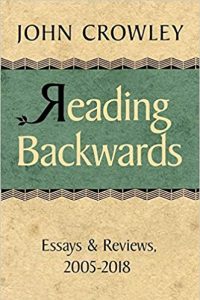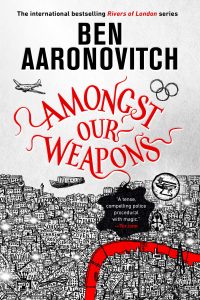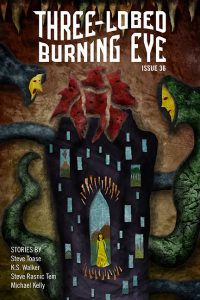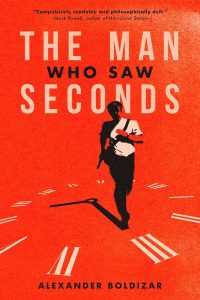Gary K. Wolfe Reviews Reading Backwards by John Crowley
 Reading Backwards: Essays & Reviews, 2005-2018, John Crowley (Subterranean 978-1-59606-946-6, $40.00, 456pp, hc), November 2019.
Reading Backwards: Essays & Reviews, 2005-2018, John Crowley (Subterranean 978-1-59606-946-6, $40.00, 456pp, hc), November 2019.
Despite his protestations in an essay titled “On Not Being Well-Read”, one of 39 essays and reviews collected in Reading Backwards, John Crowley is among the most eclectic and intriguing literary voices around, and no one sitting around in a bar with him would want to get into a contest over who’s more or less well read. Sitting around with him in a bar is the sense you sometimes get from wandering through these mostly short pieces, which range from autobiographical essays, such as his Vietnam-era experience with Selective Service or his lifelong fascination with theater and stage design, to considerations of religious thinkers from Giordano Bruno to Teilhard de Chardin, and reviews of an unusually broad range of writers. Crowley has always straddled the worlds of, on the one hand, the Yale Review and Harper’s (where several of these pieces originally appeared) and, on the other, fantasy and SF, and while there are appreciative pieces on Ursula K. Le Guin, Paul Park, Thomas M. Disch, H.G. Wells, and Joan Aiken, there are also plenty of names likely unfamiliar to most readers. Richard Hughes (probably best known for A High Wind in Jamaica) gets two essays, while others are devoted to Nicholson Baker, Leslie Epstein (whose King of the Jews is one of the more oddball Holocaust novels), and David Stacton, a writer of mostly historical novels, well regarded in the 1950s and 1960s but now nearly forgotten, who provided the model for Crowley’s own Fellowes Kraft in his Ægypt series. (We also get some insight into that series in his piece on Giordano Bruno.)
So whether or not Crowley thinks he’s well read, the list of what he’s read isn’t quite like anyone else’s, and one of the fascinations of a collection like this is how it serves as a kind of self-excavated archeology of his imagination, and the light it sheds on Crowley’s own work. Probably the most prominent recurring name here is Vladimir Nabokov, “my earliest master,” and more than once Crowley returns to Nabokov’s claim that “the great novels of the realist tradition – are actually great fairy tales.” This insight, along with critic Northrop Frye’s notion of romance as a narrative mode, had a clear effect on Crowley’s work: “About the time I read and pondered it, I was at work on what I conceived of as a fairy tale that was also a long novel in the realist tradition” – what we reasonably assume became Little, Big. Crowley’s influences weren’t all high literature, or literature at all; he admits to an early fascination with EC comics and John Wayne movies, and a fascinating essay is devoted to the work of Winsor McKay of Little Nemo fame. Some of the more intriguing essays touch upon the comics of Ben Katchor and the photography of Rosamund Purcell, and his reviews include a biography of Edward Gorey and Jack Womack’s compendium of wacky UFO lore, Flying Saucers Are Real!
Relatively few of the pieces focus on Crowley’s colleagues or predecessors in SF and fantasy, although there is an excellent essay on ghost stories that touches upon the work of Kelly Link, and, in addition to a review of Le Guin’s first Library of America volumes, a review of my own LoA collection of 1950s SF novels. As is often the case in a compendium such as this, what is most engaging is often what is least expected. He may not quite have convinced me to pick up the historical novels of David Stacton, and he pretty much convinced me not to re-read Hesse’s The Glass Bead Game, but his own insights into his world of reading are likely to stick around, and, as always, his prose is almost preternaturally graceful and clear.
Gary K. Wolfe is Emeritus Professor of Humanities at Roosevelt University and a reviewer for Locus magazine since 1991. His reviews have been collected in Soundings (BSFA Award 2006; Hugo nominee), Bearings (Hugo nominee 2011), and Sightings (2011), and his Evaporating Genres: Essays on Fantastic Literature (Wesleyan) received the Locus Award in 2012. Earlier books include The Known and the Unknown: The Iconography of Science Fiction (Eaton Award, 1981), Harlan Ellison: The Edge of Forever (with Ellen Weil, 2002), and David Lindsay (1982). For the Library of America, he edited American Science Fiction: Nine Classic Novels of the 1950s in 2012, with a similar set for the 1960s forthcoming. He has received the Pilgrim Award from the Science Fiction Research Association, the Distinguished Scholarship Award from the International Association for the Fantastic in the Arts, and a Special World Fantasy Award for criticism. His 24-lecture series How Great Science Fiction Works appeared from The Great Courses in 2016. He has received six Hugo nominations, two for his reviews collections and four for The Coode Street Podcast, which he has co-hosted with Jonathan Strahan for more than 300 episodes. He lives in Chicago.
This review and more like it in the December 2019 issue of Locus.
 While you are here, please take a moment to support Locus with a one-time or recurring donation. We rely on reader donations to keep the magazine and site going, and would like to keep the site paywall free, but WE NEED YOUR FINANCIAL SUPPORT to continue quality coverage of the science fiction and fantasy field.
While you are here, please take a moment to support Locus with a one-time or recurring donation. We rely on reader donations to keep the magazine and site going, and would like to keep the site paywall free, but WE NEED YOUR FINANCIAL SUPPORT to continue quality coverage of the science fiction and fantasy field.







